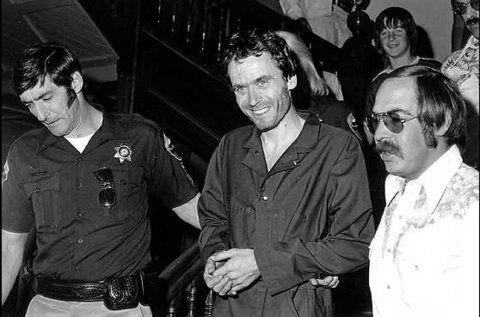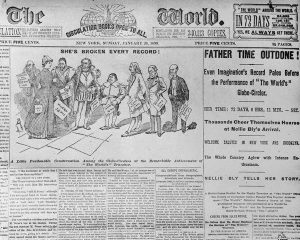Imagine knowing a charismatic and handsome person, only to find out that that person was not at all what you thought he was; he manipulated you. Theodore Bundy was that kind of person. Many will recognize his name as Ted Bundy. He was one of the most infamous of criminals in the twentieth century, known as an American rapist and serial killer. Therefore, when we hear his name, the first thing that people associate with it is the word “psychopath.” Psychopathy falls under a specific personality disorder called Antisocial Personality Disorder (ASPD).1 However, if we don’t truly understand this disorder, then someone could easily be mal-diagnosed. This is why it’s very important to know when mentioning ASPD, that there are two main types of Antisocial Personality Disorder: psychopathy and sociopathy. Researchers have long assumed that Ted Bundy was a psychopath. One eminent psychologist, Hervey Cleckley, was the first to diagnose Bundy as a psychopath, which is explained in a book that Cleckley earlier wrote called “The Mask of Sanity” (1941). He also describes the many clinical interviews he had with patients in a locked institution. However, new research conflicts with Cleckley’s assessment. In fact, William C. Levin, a well-known researcher specializing in sociology, has come to the conclusion that Bundy was indeed a sociopath. Levin elaborates on sociopathy and Ted’s behavior in an essay called “Cultural Commentary: Ted, Terrell and Angie and the Limits of Sociopathy” (2005). So, which of these two views is correct about Bundy? The evidence favors the view that Ted Bundy was a sociopath.
What is the difference between a sociopath and a psychopath? According to Ramani Durvasula, a licensed clinical psychologist and professor of psychology, a person who is referred to as a “sociopath” is someone who became so due to his or her environment.2 Environmental causes might be like when a child is abused or neglected during childhood; his or her behavior will begin to change and he or she might try to adjust to this situation by lying and performing criminal actions, which is why parents play a key role in a child’s development. However, apart from the influence of their parents, human interaction in other contexts, like interactions at school, can also be environmental causes. On the other hand, psychopaths, compared to sociopaths, are born with their disorder, with a genetic disposition due to a neurological dysfunction. The most significantly characteristic about them is that they lack empathy. Many brain scans made on psychopaths demonstrate that the area of the brain that feels empathy does not light up. They are also incapable of love and attachment. Psychopaths are arrogant people, and they believe that they are superior to anyone else.3
So, what was the case of Ted Bundy? Bundy’s childhood was a formative time in his life. He was born in 1946, his mother was unwed, and she felt ashamed of him; therefore, he had to live with his strict grandparents who had to lie to Ted that they were his parents. Furthermore, in a report written by professional psychiatrist Dr. Dorthy Otnow Lewis—who examined Bundy a day before he was executed—she said Bundy’s grandfather had been an “extremely violent and frightening individual.”4 His grandfather could have impacted Bundy significantly. Bundy was also very shy and insecure when he was a kid, which made him a constant target of bullying. In addition, Bundy at an early age started showing unusual behaviors. For example, when he was only three years old, he found knives fascinating; therefore, he put knives in his Aunt’s bed and stood there smiling until she woke up. As he grew older, when he was a teenager, his “dark” character began to appear more.
For many scholars, this experience and uncommon behavior is considered a first sign of a sociopath, because of what Ted had gone through in the early stages of his life. Consequently, due to this change in Bundy, he began to adjust and adapt in order to become stronger, and this became a major aspect in Bundy’s behavior.

Furthermore, in the DSM 5 Guidebook: The Essential compassion to the Diagnostic and Statistical Manual of Mental Disorders, sociopaths are defined as having a tendency of doing harmful actions towards others.5 They do not have a conscience, which means that when they do harm to others, they “do before thinking,” and they do not feel regrets afterward. Even though they understand the difference between good and bad behavior, they still choose “bad.” This type of person tries to fit in with everyone around him, with friends, family, and even with strangers. When we talk about friendships and relationships, sociopaths will always be charming and make friends easily, which makes it hard for others to identify this person as a sociopath. However, sociopaths can never maintain this bond because they tend to lie, manipulate, and even cheat. They are also experts at hiding who they truly are. Sociopaths are good at reading other people and helping them with what they need. By doing so, sociopaths realize these people’s weaknesses and desires, and use them in their favor as a way of manipulation or control of others. Moreover, the relational bonds that sociopaths create are just for show, in order for them to easily use them for their own personal gain.6
Ted Bundy had a five-year relationship with Elizabeth Kloepfer, who was a single mother living in Seattle in 1969. In her book The Phantom Prince, My life with Ted Bundy, Kloepfer talks about the love and vulnerability of Ted, not his murders. Her book was published when she was thirty-six-years old, and Bundy was on death row.7 Kloepfer mentions that when she first met Bundy in a bar, he was sitting alone, and she approached him, and that’s when the conversation flowed naturally and the chemistry was instant. Ted Bundy demonstrated strong feelings for Elizabeth; however, it was inconsistent. In other words, as Kloepfer mentioned in her book “The Phantom Prince, My life with Ted Bundy” (1981), “we would be getting along fine and then a door would slam and I would be out in the cold until Ted was ready to let me back in. I’d spend hours trying to figure out what I had done or said that was wrong. And then, suddenly, he would be warm and loving again and I would feel needed and cared for.” Finally, in February 1970, Bundy and Elizabeth went to the courthouse to get a marriage license; however, this did not end well. Due to a discussion they had, Bundy got very mad and he tore up the license in pieces and walked away.
Despite what happened with Elizabeth, they still maintained a very close bond, and Elizabeth gave Bundy many opportunities to fix their relationship. However, Bundy continued his life and in 1972 and 1973 Ted began to attended multiple schools as an undergraduate student. As a result of being a part of so many different campus communities, he had a wide opportunity to study the habits and vulnerabilities of female coeds, who were among his most common interest. In 1972, he graduated “with distinction” with a psychology degree from the University of Washington (UW). Bundy, while studying at UW, took a work-study job at Seattle’s Suicide Hotline Crisis Center. Here he proved that he possessed enough empathy and straight-headedness to talk people out of killing themselves. In addition, in September 1973, he began taking night classes at the School of Law at the University of Puget Sound; however, Bundy skipped many of his classes because he lost focus easily. Unfortunately, in February 1974, Bundy’s first confirmed murder victim was Lynda Ann Healy. Bundy later committed at least seven more homicides through the summer of 1974. Witnesses describe a man calling himself “Ted,” who would ask for help while wearing a sling. However, the killings didn’t stop Bundy from studying, which is why, in 1974, Bundy began studying at the University of Utah School of Law.8
Therefore, this background, for many sociologist and researchers, is considered significant for how Bundy’s behavior manifested. As mentioned before, a sociopath can be in a relationship, as was the case of Bundy and Elizabeth Kloepfer. However, this relationship would not be stable because Bundy tended to lie and manipulate, and he also knew Elizabeth’s weaknesses in order to control her. Furthermore, Katherine Ramsland, a professor of forensic psychology, believes that perhaps, thanks to the knowledge Bundy gained by studying psychology, he began his murder spree by developed his modus operandi of asking for help, which he had learned from a classic psychology experiment. His studies might have provided him with insight into how to manipulate people and to understand ways to isolate his victims.9

William Levin, a researcher, explains that a sociopath is a person who pursues his or her own interests without concern for the consequences of those actions for others.10 He mentions this to point out the murders committed by Ted Bundy. Between 1974 and 1978, Bundy killed numerous young women in four states. He was very intelligent, handsome, and charming. He also knew how to lure women and attract their attention. Bundy would sometimes put on a fake cast or used crutches, then asked women to help him, playing on their natural sympathies. He also understood that most people would obey authority figures, so he sometimes pretended to be a police officer. Bundy also seemed completely without remorse for his crimes, nor concerned in the least about the women he killed. In fact, his lack of concern for the well-being of others was remarkable for its lack of animosity. Also, sociopaths care only about satisfying their own needs or desires, and the biggest desire for Bundy was the feeling of killing a young woman.
But what about Bundy being a psychopath? What is the difference between sociopathy and psychopathy? According to Theodore Millon and Roger D. Davis, well-known American psychologists and experts in personality disorders, psychopaths are dangerous because they dissociate their emotions from their actions.11 As mentioned previously, psychopaths, compared to sociopaths, are born with their disorder, and their most significantly characteristic is that they lack empathy. Although they are unable to feel empathy, they can understand it, and even fake it, but what they are feeling is not real. That’s why they are highly intelligent but have a shallow charm. They are not afraid of taking risks because they don’t care for the consequences and they don’t stress out over their actions. They are very confident of themselves, which is why psychopaths are the hardest to detect, because they are also great actors and can easily appear normal.12
Psychopaths get a thrill from excitement and danger, which is what Bundy demonstrated when he started his crime spree with shoplifting, then moved to burglarizing homes. He also sexually assaulted women, before ultimately moving on to assaulting and killing them. Psychopaths are also criminals who do the planning. In the case of Ted Bundy, he would charm or trick his victims into following him. In an article written by Lindsey Plercy, she mentions that the father of psychopathy, Hervey Cleckley, diagnosed Bundy as a psychopath by defining psychopaths as “social predators who charm, manipulate, and ruthlessly plow their way through life—completely lacking in conscience and feeling for others. They selfishly take what they want and do as they please, violating social norms and expectations without the slightest sense of guilt or regret.”13 It is also important to point out that psychopaths are not able to maintain friendships, intimate relationships, or any kind of mutually appreciative, long-term connections with others. They are incapable of valuing people for themselves and so cannot be depended on as a friend to help out in times of need. Psychopaths see others as objects, as a way to get what they want. They also do not and cannot value people for themselves. Therefore, if a psychopath is committed in a relationship or friendship, it is not because they value the person for their virtues, talents, and morality, but because they see an opportunity to either get these traits for themselves, get something from the person, or else just manipulate and destroy them out of envy.
Multiple psychologists who interacted with Bundy during his lifetime diagnosed him with psychopathy. Ted Bundy displayed several of the hallmark symptoms of psychopathy, including antagonism, extraversion, high conscientiousness, and low neuroticism.14 Psychopaths always feel superior. They do not ask for something; instead, they just take it. Moreover, due to Bundy’s handsomeness, charisma, and intelligence, he took advantage of these traits, and was able to gain the trust of those he came into contact with, including his victims. He would approach women typically feigning disability or appearing as an authority, and ask them for assistance. After the women accepted his request, he would overpower them, rape them, then kill them in a secluded location.

Despite knowing the main characteristics of a psychopath and the many diagnoses given to Bundy, saying that he is a psychopath, according to Dr. Al Carlisle, a psychologist who evaluated Bundy after his first arrest, Bundy’s behavior demonstrates that Bundy was actually a sociopath.15 Dr. Carlisle first mentions that Bundy’s criteria for right and wrong changed over time to minimize the polarity between the good part of his brain and the evil parts. Carlisle also stated that Bundy had a prior record of aggression, was physical abused in childhood, had a substance-abusing parent, and had a diagnosis of an adjusted disorder, all these factors pointing to someone with ASPD, but more importantly, pointing to a sociopath. Carlisle mentions that he spent twenty hours with Bundy on the psychological assessment, where he described how Bundy used charm and friendliness to hide his anxiety and anger. As a result of taking psychology courses, Bundy knew what Carlisle’s questions meant and he disliked being evaluated. Ted Bundy was highly intelligent and thanks to his knowledge earned throughout the years, he was able to be one of the most feared serial killers of his time.
Therefore, after knowing about his life, his behavior, and all the evidence, Ted Bundy was most probably a sociopath. Although sociopathy and psychopathy are very similar, there are still important differences between the two behaviors. Bundy had a rough childhood, which affected his personality significantly. As he got older, many factors also influenced who he would become. Moreover, thanks to what he studied, psychology and law, it made him even smarter when it came to covering his tracks and attracting his victims.
I would like to thank the following individuals who have helped me since the beginning of this project. I’m very grateful for the support I received from my mother, and especially from my friend Abilene Solano who really helped me and encouragement me to complete this project day by day. If it were not for Abilene, I would never have finished this project. I would also like to express my gratitude for all the help I received from Daniela Durán, who gave me great advice and guided me throughout the whole process of creating this article. Lastly, I would like to thank Dr. Whitener for inspiring me to write this article, as well as helping me during the revision stage, where I received advice on grammar and writing, English is not my first language, which is why this project was very helpful and important for me to become a better writer.
- James Morrison, M.D., “Personality Disorder,” DSM-IV Made Easy: The Clinician´s Guide to Diagnosis (United States of America: The Guilford Press), 458, 474. ↵
- “Narcissistic, psychopath or sociopath: how to detect the differences,” MedCirlce, Youtube video, 25 June, 2018, https://www.youtube.com/watch?v=6dv8zJiggBs ↵
- Claudia Moscovici, “The List of Psychopathy symptoms: Hervey Cleckley and Robert Hare,” February 2, 2017, Linkedin (website) https://www.linkedin.com/pulse/list-psychopathy-symptoms-hervey-cleckley-robert-hare-moscovici ↵
- Jill Sederstrom, “What was Ted Bundy’s Childhood like?,” August 20, 2019, Oxigen (website), https://www.oxygen.com/martinis-murder/what-was-ted-bundys-childhood-like ↵
- Donald W. Black and Jon E. Grandt, “Personality Disorders: Cluster B personality disorder,” In DSM 5 Guidebook: The Essential compassion to the Diagnostic and Statistical Manual of Mental Disorders, Fifth edition, (American Psychiatric Publishing), 55. ↵
- Salem Press Encyclopedia of Health, 2019, s.v. “Sociopathy,” by Kristin Landfiel and Scott O. Lilienfield. ↵
- Jamie Bartosch, “Meet Elizabeth Kloepfer, Ted Bundy’s former girlfriend,” Jun 12, 2020, Biography (website) https://www.biography.com/news/ted-bundy-elizabeth-kloepfer ↵
- Sara Kettler, “How Ted Bundy’s Education Facilitated his career as a Serial Killer,” July 2, 2019, Biography (website) https://www.biography.com/news/ted-bundy-education-killing?li_source=LI&li_medium=bio-mid-article&li_pl=208&li_tr=bio-mid-article ↵
- Katherine Ramsland, “Bundy and the Psychologists,” February 28, 2020, Psychology Today (website) https://www.psychologytoday.com/us/blog/shadow-boxing/202002/bundy-and-the-psychologists ↵
- William C. Levin, “Cultural Commentary: Ted, Terrell and Angie and the Limits of Sociopathy”, December 2005, Bridgewater State University (website), https://vc.bridgew.edu/cgi/viewcontent.cgi?article=1148&context=br_rev ↵
- Theodore Million and Roger D. Davis, “The Development of Personality Disorder,” In Developmental Psychopathology volume 2: Risk, Disorder and Adaptation, edited by Dante Cicchetti and Donald J. Cohen. ↵
- William Hirstein, “What is a Psychopath?,” January 30, 2013, Psychology Today (website) https://www.psychologytoday.com/us/blog/mindmelding/201301/what-is-psychopath-0 ↵
- Lindsey Plercy, “A&S Pyschology Researcher Unravels Serial Killer Ted Bundys Mental Health,” June 4, 2019, University of Kentucky (website), https://psychology.as.uky.edu/psychology-researcher-unravels-serial-killer-ted-bundys-mental-health ↵
- Gina Pardi, “Ted Bundy and the Neuroscience of Psychopathy”, December 11, 2019, The Neurobiology of Becoming a Serial Killer (website), https://theneurobiologyofbecomingaserialkiller.wordpress.com/2019/12/10/ted-bundy-and-the-neuroscience-of-psychopathy/ ↵
- Katherine Ramsland, “The Psychologist and the Serial Killer”, October, 23, 2017, Psychology Today (website) https://www.psychologytoday.com/us/blog/shadow-boxing/201710/the-psychologist-and-the-serial-killer ↵




78 comments
Lorena Martinez Canavati
I’m very familiarized with Ted Bundy’s case because I’ve watched multiple documentaries and read various articles as well. You mentioned that Ted Bundy was actually a sociopath but I beg to differ. I did some research and I actually think he’s more of a psychopath, because he spent time planning the murders of his victims, could mimic human emotions without actually feeling them, and didn’t exactly have many friendly connections. Sociopaths tend to be more erratic and act without thinking things through. They also tend to have a couple people they actually care about. This isn’t really the case for this man. However, as you mentioned, he did have a problematic childhood. So whether he is a sociopath or a psychopath might remain unknown, but one can pinpoint if his traits match one more than the other.
Clarissa Liscano
After reading this article and learning the distinctions between a psychopath and a sociopath, you will be able to identify those people who genuinely know exactly what they are doing and still intend to, whether it is good or evil. Learning about the kind of upbringing Ted Bundy had and all the misery it caused him made it clear how it completely influenced who he became. Knowing that Ted Bundy suffered from childhood trauma and how that might influence someone, we need to assist others who may be living in the same household. A psychopath is someone who lacks emotional responses and poor behavioral controls, possibly as a result of being raised in a horrible household. A well-written article that I enjoyed reading and learned from.
D'vaughn Duran
Hi, The key analysis describes the difference between sociopaths and psychopaths. Also adding in other scholars opinions on what Ted Bundy’s was. That part is a good touch. This shows the conflict of psychologists and sociologists bumping heads. Also, bring up Early childhood Ted Bundy’s experiences, how the environment and trauma of a child does play an important role in any child’s life and perspective of the world. I never knew the difference between sociopaths and psychopaths till now. Lastly, How you describe him and how he had charm and lure people with looks as well. I like the structure of your article and how the placement of paragraphs fit well together.
Joshua Marroquin
First of all, I want to say that this article was very informative and well structured. I learned taht many people confuse the terms Sociopaths and Psychopaths, which is very surprising since they are both two completely different types of mental issues. Sociopaths are people who know the difference between good and evil, yet they still choose evil without caring about the consequences. While a Psychopath lacks emotional responses and poor behavioral controls. It is also amazing to learn childhood trauma can have such an impact on how the child turns out.
Quianna Wynn
Sociopaths and Psychopaths have become loosley used terms in our society today, maybe as a joke or due to the lack of knowledge on what they truly mean. I can appreciate that the article gave depth into what both actually mean and how it relates to a specific person to give very detailed context. I really loved this article and I enjoyed learning something new.
Rigel
Amazing article! I learned a lot about the personality disorder ASPD. I have learned about it before but not to this level. You do an excellent job not only explaining the differences between sociopathy and psychopathy, but also describing Ted Bundy’s life and relationships. The way you organized your article by explaining the differences between the two ASPD then explaining Bundy’s life is magnificant.
Shecid Sanchez
This article went in depth about the difference between sociopaths and psychopaths. It did an amazing job of muring these two topics together. I feel like not only did I learn about Ted Bundy and his childhood trauma and how it shaped him into what he became. The fact that early childhood trauma could completely change the way you are is so scary. I learned that sociopaths know the difference between good and bad but they still choose to do “bad”.
jess sanchez
This article went in depth about the difference between sociopaths and psychopaths. It did an amazing job of muring these two topics together. I feel like not only did I learn about Ted Bundy and his childhood trauma and how it shaped him into what he became. The fact that early childhood trauma could completely change the way you are is so scary. I learned that sociopaths know the difference between good and bad but they still choose to do “bad”.
Alia Hernandez Daraiseh
Reading this article has given me insight on Ted Bundy that I didn’t even know about. I am majoring in psychology, so learning the difference between psychopaths and sociopaths was really beneficial to me. Learning about the potential of why Ted Bundy did what he did also fascinates me, it makes me eager to learn more about psychology. It makes the situation a lot more eerie though, knowing he went into psychology just so he could lure his victims in. It makes me shiver just thinking about how the women fell for his charismatic character, only to get harmed in the end.
Idaly Oropeza
This article did a great job comparing sociopaths and psychopaths. The two both have many similarities and I feel like they get mixed up a lot. As far as learning more about Ted Bundy , it is very interesting read how his environment affected him to become who he was. I think that studying psychology really aided him in becoming someone who is incredibly smart. He most definitely knew what he was doing and who he was going to become in doing so.